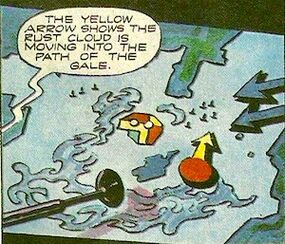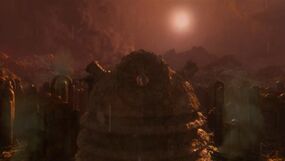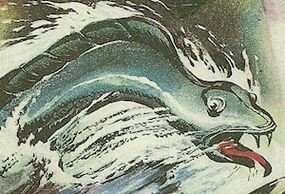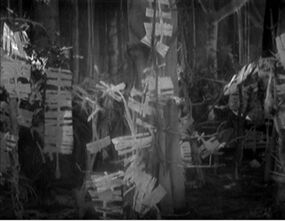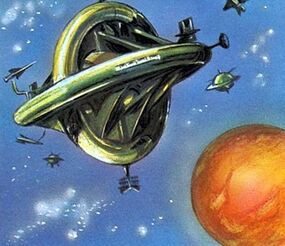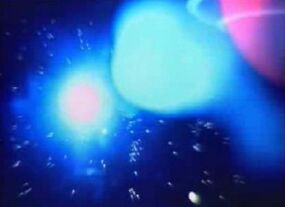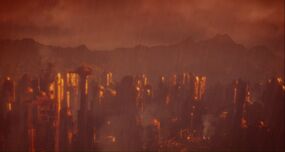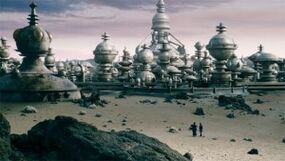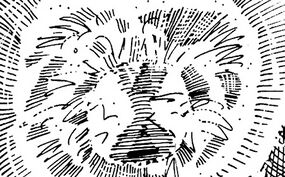Skaro
Skaro was the homeworld of the Thals, of the Kaleds, and infamously, of the Daleks. The latter came to be during the Thousand Year War between the Thals and Kaleds because of the actions of the Kaled scientist Davros. After its devastation and irradiation during this war, Skaro became uninhabitable to humanoids without regular anti-radioactivity drug treatments. Subsequent attacks on the planet caused by the Dalek presence would nearly destroy it, but eventually, Skaro was remade by the Daleks and became the centre of the Dalek Empire once more.
Astronomical data
Location
Most accounts placed Skaro as a long way away from Earth: one explained that it was in the Seventh Galaxy and nine Galaxies away from Earth, (PROSE: The Infinity Doctors, COMIC: Legacy of Yesteryear) while another account described Skaro as being "in the next universe but one", (PROSE: Doctor Who in an Exciting Adventure with the Daleks) while another stated that Skaro was "half a universe away" from Earth. (COMIC: The Planet of the Daleks) According to another account, it was located in the Eighth Galaxy. (AUDIO: The Destroyers) Skaro was, at any rate, located in hyperspace. (COMIC: Genesis of Evil)
According to one account, Skaro was a wandering "mystery planet". It moved into Earth's Solar System in the 25th century, becoming located at an elliptical orbit around Earth's Sun. During this time, its orbit crossed that of Uranus and occasionally put it in the vicinity of Jupiter and Saturn. The Daleks seemingly had nothing to do with this movement, and, indeed, were frightened by the fact that Skaro's new position put it within reaches of Earth's expansionist space empire. (COMIC: Invasion of the Daleks)
It was the twelfth planet in its solar system, (TV: "The Ambush", PROSE: The Infinity Doctors) and it had at least two suns. (PROSE: The Stranger) It had a similar atmosphere, climate and gravity to Earth, though it was plagued by sulphuric rain. (GAME: City of the Daleks, TV: Asylum of the Daleks) Skaro's nearest neighbour was a planet called Alvega. (COMIC: The Amaryll Challenge)
Nature
Skaro's radius, from the surface to the center of its cold planetary core (the Ice Heart of Skaro), was about 10000 miles. Directly below the surface of Skaro was a "cellular layer" consisting of a network of caves inhabited by tunnel beasts. Below were the Zone of Eternal Dark, home to eerie glowing creatures; the Stratum of Screaming Winds, inhabited by Suckers; the Abyss of Death with its walls of living rock; the "depths of unknown" with their masters the Krakis; and finally the Morass, encasing the Ice Heart directly, domain of the sponge people. (COMIC: The Dalek Trap)
Landscape
Before neutronic war broke out, the Daleks' humanoid forefathers and their rivals the Thals lived on two separate continents of Darren and Davius, separated by the Ocean of Ooze, (COMIC: Genesis of Evil) although by the end of the Thousand Year War, Skaro had a single large continent as the stage of the ongoing conflict between the Thals and the Kaleds. The continent was, however, divided in two by an immense mountain range. (TV: Genesis of the Daleks)
Much of Skaro was a wasteland, devoid of all life after centuries of war. (TV: Genesis of the Daleks)
A jungle once grew near the Dalek City. Following an exchange of neutron bombs, the jungle was petrified. Radiation levels across most of the planet remained high. There were less irradiated plateaus where the Thals lived. (TV: The Daleks)
Hydrothermal activity was indicated by the presence of place names like "Geyser Swamp". However all bodies of liquid may not have been composed of water. At least one river was known to be comprised of sulphuric acid, and the geysers in Geyser Swamp spewed mercury, rather than steam. (COMIC: Duel of the Daleks)
The planet had polar ice caps. The mountains at one of the poles were known as the Polar Mountains. (COMIC: Legacy of Yesteryear)
After being restored by the Daleks, Skaro appeared to have been, to an extent, returned to the pristine state it held before it became war-torn, as it was safe for Clara Oswald, Missy and the Twelfth Doctor to walk around without worry of radiation sickness (TV: The Magician's Apprentice) and the skies were clear enough to see the sun rise and fall. (TV: The Witch's Familiar)
Geographic features
This section needs to be sourced.
Continents/regions
There were various regions on Skaro, notably Davius, Dalazar, the Wastelands and Darren. (COMIC: Genesis of Evil)
Rivers, lakes, and oceans
The Ocean of Ooze was an ocean on Skaro that separated Davius and Dalazar. (COMIC: Genesis of Evil) Additionally, there were several seas such as the Bottomless Sea, the Sea of Acid, the Sea of Rust the Serpent Sea and even the River of Whirling Waters.
There was a lake called Drammankin Lake. (AUDIO: Innocence) However, it was more commonly referred to by the Kaleds as the "Lake of Mutations". (AUDIO: Corruption)
One area was also known as the Geyser Swamp.
Islands
The Forbidden Islands were on Skaro.
Settlements
Many cities and settlements existed on Skaro throughout its history, though the Thousand Year War made much of the planet's surface an inhospitable wilderness. The Darrien province and the Kaled Dome dated back to the Kaled/Thal occupation of the planet, (TV: The Daleks) but by far the most notorious and enduring conurbation on Skaro was the Dalek City, built by the Daleks immediately after their emergence (COMIC: Power Play) and used as their main base of power on Skaro throughout their history. (TV: The Daleks, The Evil of the Daleks, The Magician's Apprentice, PROSE: War of the Daleks) According to one account, the Daleks' capital city was Kaalann. (GAME: City of the Daleks) The black, friable spires of Yarvelling's Church from Skaro were a fragment of the Last Great Time War. According to one account, the Eighth Doctor saw the Cathedral fused with fragments of Morbius' Red Capitol in the backwater where he triggered the Moment. (PROSE: Doctor Who and the Time War)
Native life
All Skarosian life had DNA, (AUDIO: Corruption) which was fundamental type 467-989. (TV: Daleks in Manhattan) Most of Skaro's animal and plant life became extinct as a result of the Thousand Year War. (AUDIO: Corruption) Some of the survivors included the Varga plants (TV: Mission to the Unknown) and Slythers. (TV: The Dalek Invasion of Earth) The Lake of Mutations was home to a variety of life-forms, including the terrorkon. (TV: The Daleks, COMIC: The Terrorkon Harvest) At least one area of the planet was inhabited by large dinosaur-like creatures. (COMIC: The Planet of the Daleks) Another Skarosian life form were magnedons; most perished in the war, leaving the landscape littered with their metallic exoskeletons. (TV: The Daleks)
Several sentient species evolved on Skaro, including the Dals, Tharons, Kaleds and Thals. By the time of the Thousand Year War, the Tharons and Dals had died out. (AUDIO: Purity) The Mutos were mutated Kaleds and Thals, and the species which became most associated with Skaro, the Daleks, likewise descended from the Kaleds. (TV: Genesis of the Daleks) According to one divergent account, which made no mention of the Kaleds, the sapient species at odds with the Thals were short, large-headed, blue-skinned humanoids who already called themselves "Daleks". (COMIC: Genesis of Evil) Yet another dissenting account uniquely held the Daleks' planet of origin to not have been Skaro at all but rather Ameron. (PROSE: We are the Daleks!) These accounts were later postulated to have been either mythologised retellings of Dalek history or alterations to the Dalek timeline as a result of the Last Great Time War. (PROSE: Dalek: The Astounding Untold History of the Greatest Enemies of the Universe)
Intelligent insects called Zomites also lived on Skaro even well into the metallic Daleks' occupation of the planet; the Daleks considered them a "pest" and worked to destroy them, even allowing other "inferior" creatures to live on Skaro if they helped in the extermination of the Zomites. (COMIC: The Daleks Destroy the Zomites)
History
Pre-War history
Though Thals used the same name for their world, in the Kaled language, "Skaro" meant "home". (PROSE: War of the Daleks)
Historians who studied the Dalek race believed that life on Skaro had progressed in a manner similar to early Earth, beginning in its oceans and eventually spawning reptilian land creatures that were supplanted by humanoid life. They were unsure however as to whether this life had been naturally occurring or seeded on Skaro by alien powers. (PROSE: Dalek: The Astounding Untold History of the Greatest Enemies of the Universe) Bernice Summerfield pondered if prehistoric Skaro had been one of the worlds to which the SSSSSSS had sent Aryan DNA samples to, resulting in the Thals' physical appearance. (PROSE: Down)
100 million years prior to the Thousand Year War, the ancestors of the Kaleds diverged from those of the Thals. (AUDIO: Corruption) Despite this, archeological findings suggested that the two races had co-existed in at least one shared settlement in ages past. Two other humanoid races, the Tharons and the Dals, had existed on Skaro but both had fallen victim to a genocidal campgain by the Kaleds. (AUDIO: Purity)
Following the neutronic war, Alydon described Skaro as once having been a great world "full of ideas and art and invention" before war had destroyed it all. (TV: The Daleks) Memories of this incarnation of Skaro had survived into the era of the Thousand Year War, though Davros saw little reason to retain any affection for it. (PROSE: Father of the Daleks)
A war-torn world: creation of the Daleks
- Main article: Creation of the Daleks
According to one account, by the time of the creation of the cyborgs known as the Daleks, the Kaleds and the Thals fought the Thousand Year War over the wasteland adjacent to the Kaled Dome. (TV: Genesis of the Daleks) Whilst differing as to the length and circumstances of the war, many other accounts agreed that the Daleks had come about in the aftermath of a war between the Daleks' humanoid forefathers and the Thals. (TV: The Daleks, COMIC: Genesis of Evil)
The cause of this war was unknown though it was speculated that the construction of the Thal Dome had prompted the Kaleds, out of bitter jealousy and paranoia, to construct the Kaled Dome leading to a state of cold war and a technological arms race that eventually devolved into open war. (PROSE: Dalek: The Astounding Untold History of the Greatest Enemies of the Universe)
Davros was a Kaled child who grew up in the midst of the War. The Twelfth Doctor, accidentally landing in the middle of the War, once passed the young Davros the Doctor's sonic screwdriver to speak to him across a minefield of handmines, not realising who he was going to grow up to be until the boy said his name. The Doctor reconsidered helping Davros get out of the minefield, and later, a future version of the Twelfth Doctor arrived on Skaro and pointed a gunstick at Davros in an attempt to save his friend, "the only way [he could]". (TV: The Magician's Apprentice) He then proceeded to destroy the handmines and save Davros to teach him the concept of mercy before taking him home. (TV: The Witch's Familiar)
Technology had devolved in this time. A Scientific Elite governed the Kaleds. By this phase of the war, biological and nuclear weapons had begun to cause mutations known as Mutos. (TV: Genesis of the Daleks) The Thals also underwent many mutations as a result of the War, though they eventually reverted to a humanoid form similar to their original one. (TV: The Daleks)
Although some accounts stated that these mutations of the Thals' nemeses led to their becoming the familiar tentacular blobs of hateful flesh who sealed themselves in armoured travel machines to become the Daleks, (TV: The Daleks, COMIC: Genesis of Evil) another held that before it came to that, the Kaled scientists saw the increasing number of Mutos as the end of their species in its "pure" form. Davros, now the Kaled chief scientist, (TV: Genesis of the Daleks) effectively making him the king of Skaro, (TV: Dalek) decided to accelerate the mutations on purpose to determine their "ultimate form" and placed the results in travel machines, though not before making his own alterations to their genetic code to make sure that they would be heartless killers with an innate belief in their own supremacy, making them the perfect warriors as conceived of by Davros: "soldiers who would never, ever stop". (TV: Genesis of the Daleks, The Magician's Apprentice)
The Fourth Doctor, transported to this time period by the Time Lords to prevent a possible future where the Daleks would rule the universe, was given the chance to destroy the first incubating Dalek embryos but feared that he had not the moral right to wipe an entire species of sentient lifeforms from history, never mind how infamous. The Doctor nevertheless played a part in entombing these early Daleks in their bunker, from which he hoped it would take them centuries to escape. The Daleks still survived and promised to re-emerge. (TV: Genesis of the Daleks)
A neutronic war capped off the long-standing conflict between the Thals and their nemeses, leaving Skaro utterly inhospitable to the lifeforms who had flourished there before it. Some Thals survived by developing an anti-radiation drug, (TV: The Daleks, COMIC: Genesis of Evil) whilst what few numbers of their humanoid enemies had survived the neutronic strike died of radiation poisoning. (COMIC: Genesis of Evil) The Daleks, on the other hand, could survive in the irradiated atmosphere thanks to their travel machines. (TV: The Daleks)
After building a Dalek City for themselves, (COMIC: Power Play) the Daleks believed the Thals to have been utterly annihilated at the end of the war, though they had in truth merely faded into obscurity by forsaking most technology and becoming peaceful farmers. (TV: The Daleks)
Historians from an era following the Last Great Time War believed that, immediately following the end of the Thousand Year War, the Daleks erected the Dalek City only for their settlement to come under attack by what remained of the Thal race. In response, the first generation of Daleks detonated a neutron bomb but had underestimated the yield of its fallout, leaving them trapped in their city for the next five centuries, while the bomb had wiped out virtually all life on Skaro save for the Daleks themselves. (PROSE: Dalek: The Astounding Untold History of the Greatest Enemies of the Universe)
The aftermath of the Thousand Year War, Neutronic War and Dalek Creation
As the centuries passed and the radiation levels dropped, the Daleks made plans to spread out across and rebuild Skaro, carving out a series of subterranean tunnels leading out from their city. (AUDIO: Return to Skaro) Dependant on static electricity however, they were limited to movement along inductive metal surfaces. (TV: The Daleks) It was speculated that prior to the Thal-Dalek battle, the Daleks had made some progress in colonising their planet. (PROSE: Doctor Who and the Dalek Invasion of Earth, AUDIO: Return to Skaro) The Thals meanwhile believed that they were now of intellectual and physical perfection. They lived a simple pastoral and pacifist lifestyle on a high plateau that was spared the neutronic fallout, though their lifestyle was dependant on a biennial rainfall. (TV: The Daleks)
When the First Doctor fled prehistoric Earth, (TV: An Unearthly Child) he attempted to return to 1963 London only for his TARDIS to bring him to Skaro, (PROSE: What the TARDIS thought of "Time Lord Victorious") knowing how important encountering the Daleks would be to the Doctor's character. (TV: Into the Dalek)
The Doctor's companion, Ian Chesterton, taught the Thals to use violence in self-defence, in order to protect themselves against the xenophobic Daleks who threatened them. The Daleks came to know, during this time, that they had adapted to become dependent on radiation. With levels subsiding and their lives threatened, the Daleks proposed to set off another neutron bomb. As this would take too long, the Daleks instead planned to release radiation from nuclear reactors into the atmosphere.
A combined effort by the Doctor, his companions and the Thals resulted in the electricity supply for the city being cut off, leaving the Daleks immobile and powerless. The Doctor and his companions believed the Daleks had died to the last, and lamented that they had not found another, less bloody way to save the Thals. (TV: The Daleks) One account suggested that the Thal-Dalek battle had taken place eighteen months prior to 31 July 2065, logically placing this fateful alien visit to Skaro in early 2064. (PROSE: Peaceful Thals Ambushed!) During this time, Bernice Summerfield became trapped on Skaro, unable to leave due to the time lock on the planet, only managing to escape when the planet was destroyed. (AUDIO: The Lights of Skaro)
However, the Dalek race survived. The Doctor would later theorise that they had other colonies on Skaro, (PROSE: Doctor Who and the Dalek Invasion of Earth) and another account stated that the Supreme Dalek had survived. Though it and its Dalek forces were defeated during the Doctor and his companions' return to Skaro, the Thals were certain that the Daleks were not truly defeated. (AUDIO: Return to Skaro) One more account stated that the Daleks the Doctor had faced during his first visit had survived. According to this, it was their encounter that made them aware of the existence of other worlds. (AUDIO: The Lights of Skaro) Nevertheless, the Daleks did turn their attention towards the conquest of space, and, notably targeting Earth in the 22nd century (though that invasion was thwarted by the Doctor), steadily forged a sprawling Dalek Empire. (TV: The Dalek Invasion of Earth, Resolution, COMIC: The Amaryll Challenge, Legacy of Yesteryear, The Road to Conflict et al.)
The Doctor, Ian and Barbara Wright visited Skaro again, where they inadvertently helped the Daleks exterminate their pests, the Zomites. (COMIC: The Daleks Destroy the Zomites)
Spaceflight era and after
By the 25th century, Skaro was a "wandering planet". It drifted into Earth's solar system, leading the Emperor to attempt to conquer the system and enslave humanity, partially out of fear that the rapidly-expanding Earth Empire might conquer Skaro, instead. (COMIC: Invasion of the Daleks) Skaro Command was in charge of the Dalek military effort during the Second Dalek War. (AUDIO: Out of Time)
The Dalek Prime later moved into a larger casing at the cost of his mobility, (PROSE: The Evil of the Daleks) ruling from within the Dalek City in an enormous casing. In this era, the Second Doctor seemed to cause the Daleks' "final end", introducing the Human Factor in a faction of Daleks to spark a devastating Dalek Civil War. (TV: The Evil of the Daleks)
By the 26th century, it seemed that the Thals had reclaimed Skaro from the Daleks. (TV: Planet of the Daleks) However, it was back under the control of the Dalek Prime's forces during the the Dalek-Movellan War (PROSE: War of the Daleks, TV: Destiny of the Daleks) and into the early stages of the Imperial-Renegade Dalek Civil War between the Dalek Prime and Davros's forces. (PROSE: War of the Daleks)
By the tail end of the War, "just in time" for its apparent destruction, however, Davros and his Imperial Daleks had wrenched back control of the planet. (PROSE: Special Daleks)
Destruction of Skaro
- Main article: Destruction of Skaro
Skaro was destroyed when, as planned by the Seventh Doctor, (TV: Remembrance of the Daleks) the Hand of Omega detonated its second sun, (PROSE: The Stranger) causing it to go supernova. The stellar explosion released a shockwave which quickly struck the nearby world. It ripped and burned the planet to smithereens. (TV: Remembrance of the Daleks)
The Dalek Prime later claimed that Skaro had not in fact been destroyed. According to him, the Daleks, during their invasion of Earth in the 22nd century, had discovered records that showed Skaro's destruction. Failing to change history altogether, the Daleks had instead decided to terraform the planet Antalin into a decoy Skaro and manipulated both Davros and the Doctor, ensuring that both believed Antalin's coordinates to be Skaro's. Thus, as the Eighth Doctor discovered in horror when both he and Davros returned to the Dalek Prime's Skaro, it was Antalin which the Hand of Omega had destroyed, and Skaro remained, intact, as the Dalek Prime's power base.
Davros, unwilling to believe that his own creations had tricked him so thoroughly that he didn't know his own home planet, instead reasoned that Skaro had indeed been destroyed, but that the Dalek Prime may then have terraformed some other planet to resemble the Daleks' old home world and then fabricated the story of Skaro's survival — by Davros's reckoning, the Daleks under the Prime's command would have been too young to have known the original Skaro, and thus would not have known any better. (PROSE: War of the Daleks) Indeed, the Twelfth Doctor once remembered that Skaro had been destroyed by the Hand of Omega. (PROSE: Twice Upon a Time) Another theory was that the Daleks manipulated the timelines, making it so, while the planet was destroyed, they reconstituted it, effectively erasing the destruction from time. (PROSE: The Whoniverse)
According to another account, the Imperial Daleks had won the war with the newly crowned Emperor of the Restoration being the one who restored Skaro. (PROSE: The Restoration Empire) After detecting temporal fluctuations caused when the Tenth Doctor poisoned the Kotturuh in the Dark Times, (PROSE: The Knight, The Fool and The Dead) the Daleks invaded Islos to gather more information. The Chief Archivian however bargained with an Entity to save their people, offering it the Daleks in return. (WC: The Archive of Islos) Faced with this foe, the Daleks were forced to abandon Skaro. (WC: The Sentinel of the Fifth Galaxy) After the Mechanoids sent the Entity back to its original dimension, the Emperor and Prime Strategist returned to Skaro and recalled other surviving Daleks. The Mechanoids followed to destroy the Daleks for good but were caught off guard by the reinforcements, having believed the Emperor and Strategist to be the last. A battle ensued, during which the Queen and Mechanoid 2150 attempted to convince the Strategist to betray the Emperor. He pretended to agree and they plotted to use Skaro's beam projector to send the Emperor through a portal to the Entity's dimension. The Strategist betrayed them and instead sent every Mechanoid on Skaro through it. (WC: Day of Reckoning) The Daleks were subsequently attacked by the Hond. With Skaro in danger of falling, the Daleks recruited the Tenth Doctor to help their defence. After working with the Prime Strategist, he was able to devise a way to pacify the Hond, saving Skaro. (COMIC: Defender of the Daleks)
Whatever account was right, Skaro, or a version of the planet, survived. (PROSE: The Whoniverse) The Master's execution took place on Skaro and the Seventh Doctor made arrangements to go there to pick up the remains. (TV: Doctor Who) The fact that the Doctor could do this indicated a somewhat less hostile attitude of the Time Lords towards the Daleks under President Romana. (PROSE: Lungbarrow)
Last Great Time War
Romana's attempts at peace (PROSE: Lungbarrow) did not stop tensions from reaching a boiling point, as the tensions between the Daleks and Time Lords eventually broke out into the Last Great Time War, a temporal conflict fought between them for the sake of reality itself. (TV: Gridlock) Skaro served as the base of the Dalek Empire during the War. Opposing Gallifrey, Skaro's history was time-locked to prevent further Time Lord incursions. (AUDIO: Legion of the Lost) The Time Lords planned to unleash a genetically engineered breed of Dalekanium-eating Vashta Nerada against Skaro but were forced to abandon the project following an incident on Synthesis Station. (AUDIO: Day of the Vashta Nerada) The Severance of Skaro occurred during the conflict. (PROSE: The Whoniverse) During the closing actions of the war, the War Doctor arrived on Skaro, destroyed the majority of the Dalek Emperor's fleet, and, using a stolen gunship, burned the words "no more" into the Dalek City. (PROSE: The Day of the Doctor)
According to a history of the universe, Skaro was destroyed due to the devastation wrought by the war. (PROSE: The Whoniverse) After escaping the conflict, Dalek Caan, a member of a Dalek group known as the Cult of Skaro, stated that the planet was "gone, destroyed in a great war". He contrasted what happened to Skaro with New York City, where "versions of this city [stood] throughout history". (TV: Daleks in Manhattan) Incorrectly believed to be the only survivor, the Doctor was once described as the only person to leave "the ruins of Gallifrey and Skaro" after the War. (PROSE: Meet the Doctor)
Resurrection of Skaro
After the new Progenitor Daleks escaped, (TV: Victory of the Daleks) they rebuilt Skaro, (TV: The Witch's Familiar) the Dalek Emperor, their city of Kaalann and made Skaro the centre of the New Dalek Paradigm. The Eleventh Doctor discovered that the New Dalek Empire had invaded Earth in 1963. He went to the rebuilt city of Kaalann and discovered that the Daleks had found the Eye of Time, which helped them alter Earth's timeline. Using the Eye, the Doctor travelled to Kaalann in its ruined state before the return of the Daleks. He sabotaged the Daleks' vision, allowing him to deactivate the Eye. The timeline returned to normal and the New Dalek Paradigm and their 1963 invasion of Earth were erased. Skaro reverted to its ruined condition. (GAME: City of the Daleks)
An area of the petrified jungle was salvaged by humans at some point close to the 41st century and taken to Earth's Station 7 for research. (COMIC: The Only Good Dalek)
At a time when Skaro was in ruins, with the conditions of its environment even worse than after the Thousand Year War, the Eleventh Doctor revisited the devastated world after being summoned by a woman called Darla, who claimed to have been looking for her daughter, Hannah. He did this with great reluctance, even going as far as avoiding saying its name. However, this was a trap to capture him; Darla had been taken over by the Daleks. (TV: Asylum of the Daleks)
A dying Davros returned to Skaro, which had been completely restored by this point, after barely surviving the destruction of his Crucible at the hands of the Meta-Crisis Tenth Doctor, claiming "Where does an old man come to die? But with his children." Davros later sent Colony Sarff to find the Twelfth Doctor and bring him to Skaro. The Doctor willingly came and was joined by Missy and Clara Oswald. The building Sarff's ship landed in appeared to be a space station floating in space but turned out to actually be on Skaro with the rest of the planet invisible to the rest of the universe. Whilst Davros occupied the Doctor, showing him conversations from their previous encounters, Missy and Clara were seemingly exterminated. (TV: The Magician's Apprentice) However, Missy had rewired their vortex manipulators to absorb the energy and teleport away. Needing to get back into the city, they breached the sewers. There they discovered ancient Dalek mutants who, unable to die, had devolved into sludge. Davros was able to convince the Doctor to give up some regeneration energy to Davros to sustain him until the sunrise. The cables surrounding the Doctor were actually Colony Sarff, who trapped the Doctor. Regeneration energy was transmitted to every Dalek on Skaro, and the Daleks were reborn with new Time Lord powers.
However, this was a ruse by the Doctor. The energy regenerated the sewer Daleks, who destroyed the Dalek city. The Doctor and Clara left in the TARDIS, leaving the Dalek City a crumbling ruin. (TV: The Witch's Familiar) A book covering the universe's history theorised that this planet had not been the original Skaro but another planet renamed as such when, at some point after the Shoreditch Incident, the Daleks adopted it and erected another Dalek City upon its surface. The book cited that the petrified jungle and the Drammankin Lake were not seen during the Doctor's visit, even though they had been very close to the Dalek City. The book's placement of the event also suggested it had occurred prior to the Time War, (PROSE: The Whoniverse) but Davros, the Doctor, and Missy had all concurred that the planet was the original Skaro, resurrected in the post-Time War era. (TV: The Magician's Apprentice, The Witch's Familiar)
Additionally, when Missy wrote a postcard to the Doctor from Skaro, she mentioned the Petrified Forest and Ocean of Ooze. She also took a Slyther as her pet, which ate any Thal they encountered. (PROSE: Postcards from the Universe)
Though a group of historians from an era that followed the Last Great Time War tentatively postulated that the Dalek race had fallen at the Siege of Trenzalore, the historians knew that Skaro itself persisted into their time, still hidden behind its invisible barrier. (PROSE: Dalek: The Astounding Untold History of the Greatest Enemies of the Universe)
The final end
A short time before the First Doctor and Susan Foreman first landed at 76 Totter's Lane, a powerful being known as the Father of Time, who was in truth the Doctor's own future self, took the Doctor and Susan to the Skaro of the "unforeseeable future", being careful not to reveal the name of the Daleks to them, (COMIC: The Test of Time) as they had yet to meet them on a much earlier Skaro. (TV: The Daleks)
There, the Doctor and Susan met two advanced Daleks in spiked, bumpless casings, who were guarding Zone X, where an excavation into the very heart of Skaro could be accessed. Before the Daleks could exterminate the two Time Lords, the planet began to tear itself apart, the final consequence of all the abuse the Daleks had put themselves through. The Doctor and Susan survived by thinking to ride out the storm from the very heart of the planet; considering that they had passed his "test", the Father of Time pulled Susan and the Doctor back into their TARDIS just as Skaro imploded. (COMIC: The Test of Time)
Alternate timelines
In an alternative 22nd century, the Daleks conquered Earth after World War III had occurred there in the 20th century. The Daleks transported Earth's mineral wealth back to Skaro. (TV: Day of the Daleks)
In one alternate timeline, the Dalek Emperor destroyed Skaro by exploding the planet in the 43rd century when it came under attack by the Mutant Phase. (AUDIO: The Mutant Phase)
In another alternate timeline, the planet suffered a similar history of desolation after an accidental neutron war. However, the Daleks developed as a peaceful species rather than the war-like creatures from the original timeline. Skaro in this timeline was, according to the Doctor, the universal centre of civilisation, philosophy, democracy and art. Species from all over the universe came to Skaro, even the Time Lords. However, this timeline was unstable and solar activity of the sun of Skaro began increasing before the Doctor restored the timeline. (PROSE: The Ripple Effect)
In an alternate timeline where the Cybermen used Time Lord resources to conquer all of time and space, the Cybermen conquered Skaro and erased the Daleks from history. (COMIC: Supremacy of the Cybermen) Eventually, the Cybermen forced the Fifth Doctor's TARDIS to land on Skaro, where a Nomad Cyber-Leader ordered a CyberIsomorph to kill the Doctor and Peri Brown. (COMIC: Prologue: the Fifth Doctor) This timeline was eventually erased when, at the end of the universe, the Twelfth Doctor and a betrayed Rassilon used the Eye of Harmony on Gallifrey to regenerate the universe and restore the original timeline. (COMIC: Supremacy of the Cybermen)
Other Skaros
Just as they colonised "New Skaro," the Daleks made other planets they conquered into "Skaros," as they did to the Seriphia Galaxy (AUDIO: The Apocalypse Element) and planned to go to the Sunlight Worlds. (PROSE: The Dalek Generation) This was because the word "Skaro" in the Dalek tongue simply meant "home". (PROSE: War of the Daleks)
Minor references
The Tenth Doctor once stated, "A foe that cannot be killed, that would put the fear of Skaro into you". (PROSE: The Resurrection Casket)
Davros was regarded as the Dark Lord of Skaro. (TV: The Magician's Apprentice)
As recorded by the Testimony, the "Destroyer of Skaro" was a name for the Doctor. (TV: Twice Upon a Time)
When the Tenth Doctor had discovered a way to turn the Kotturuh's necrotic retro-virus against them, he pondered about how the planets in his time would evolve without death's influence, theorising that Skaro would never fall victim to the wars that had led to the creation of the Daleks. (PROSE: The Knight, The Fool and The Dead)
Behind the scenes
According to the non-narrative source The Dalek Pocketbook and Space Travellers Guide, the Island of Gushing Gold was a landmark on Skaro which jetted molten gold into the air.
Information from invalid sources
Among others, Radio Free Skaro was a podcast. (NOTVALID: Tom Baker stars in John Lloyd's lost Doctor Who adventure, The Doomsday Contract)
External links
| ||||||||||||||||||||||||||||||||||||||||||||||||||||||||||||||
